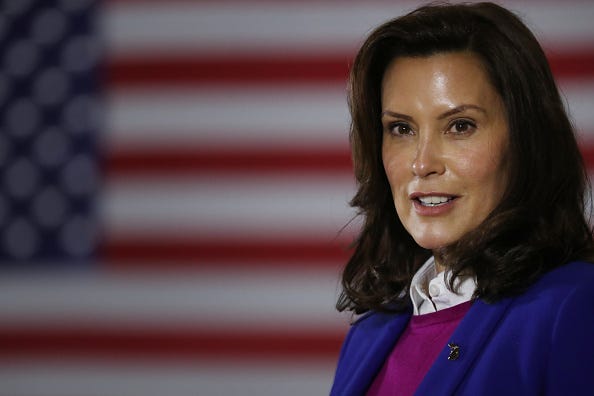
(WWJ) -- Gov. Gretchen Whitmer has released a new plan aimed at helping Michigan workers and small businesses as the state continues to recover from the COVID-19 pandemic, using money the state received from federal relief funding.
Whitmer, who announced details of her Michigan Economic Jumpstart Plan Thursday in Grand Rapids, says she wants to spend $300 million to encourage businesses to increase current pay to at least $15 per hour.
Another $300 million would be used to help restaurants and other small businesses cover costs and meet payroll, as well as help companies who were left out of other incentives offered during the pandemic.
Another focal point of the governor’s plan would also expand access to childcare for families with young children who want to return to work but cannot.
“With more than $2 billion remaining in Coronavirus Response and Relief Supplemental Appropriations Act funding, nearly $20 billion in total funding form the American Rescue Plan, the state is in a very strong position to make large investments that can transform the state and help Michigan families and small businesses recover from the pandemic,” the governor’s office said in a press release.
Whitmer says as her administration continues to take steps aimed at jumpstarting the state’s economy, they’re focused putting Michigan back to work with “better jobs and bigger paychecks.”
“Under the Michigan Economic Jumpstart plan, we can harness these once-in-a-lifetime economic opportunities and channel it to raise wages, invest in small businesses, and uplift families,” Whitmer said. “I look forward to engaging the legislature, local communities, and Michiganders as we continue thinking through the best ways to use the federal funds and state surplus to turbocharge our economy and make a real difference in people’s lives.”
In the matter of one year, the state has gone from a deficit of nearly $3 billion to a $3.5 billion surplus, thanks to the American Rescue Plan, according to the state.
“Better Paychecks”
With that surplus on the table, Whitmer’s plan focuses on juicing up Michiganders’ paychecks, with the “MI Bigger Paychecks” proposal. Her plan would utilize $300 million to encourage businesses to increase wages by offering grants to cover the difference between their current wage and $15 per hour.
The governor’s office says these grants “would cover the first three months of this raise for workers if businesses commit to retain the employee and continue the $15-per-hour wage for at least three more months.”
Another point of the governor’s focus on better paychecks includes providing $120 million to “build on the successful, bipartisan Michigan Reconnect program to ensure a pathway to a better-paying job through tuition-free credential, certificate or associates degree for anyone 25 years or older.” The governor says the program has already accepted more than 70,000 Michiganders.
Whitmer’s plan would also “recognize the sacrifices frontline workers made through the pandemic to help keep the rest of the state going by providing them with tuition-free paths to earn a degree or certificate.
The Futures for Frontliners program has already accepted more than 120,000 frontline Michigan workers.
Small Businesses
Whitmer also laid out the Michigan Small Business Restart Program, which would also invest an additional $300 million in the state’s small businesses.
The governor’s office says $100 million of that money would go towards restaurants and other “place-based” businesses to help “cover costs by providing grants up to $20,000 for mortgage, rent, taxes, payroll and other operating expenses.” That plan would also set aside $25 million for small businesses with fewer than nine employees -- which account for more than half of the state’s businesses and a high proportion of women- and minority-owned businesses.
The governor’s Michigan Microenterprise Support Initiative would received a $125 million cut of that federal funding to provide grants for businesses that did not qualify or apply for other incentives such as the Paycheck Protection Program.
That plan would work with community development financial institutions to provide loans to rural businesses or other businesses with fewer than nine employees that struggled to access capital through traditional programs.
The remaining $75 million would go to providing grants to start-ups under the Michigan Small Business SmartZones and Business Accelerator Resiliency Initiative.
Childcare
The final point of Whitmer’s Jumpstart program focuses on helping families access childcare as the state returns to work.
The governor is proposing a $370 million investment to expand access to no-cost and low-cost childcare for 150,000 additional Michigan families.
“Right now, Michigan needs talent, and regardless of whether a child is 12 months or 12 years old, working parents can’t work without safe, quality, affordable childcare,” Whitmer said.
Her plan would temporarily increase the income eligibility threshold from 150% to 200% of the federal poverty line, waive out-of-pocket copays through fiscal year 2022, and provide a 10 percent increase in hourly rates for child-care providers.



